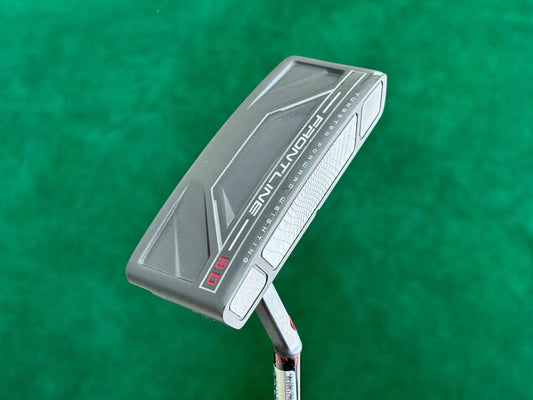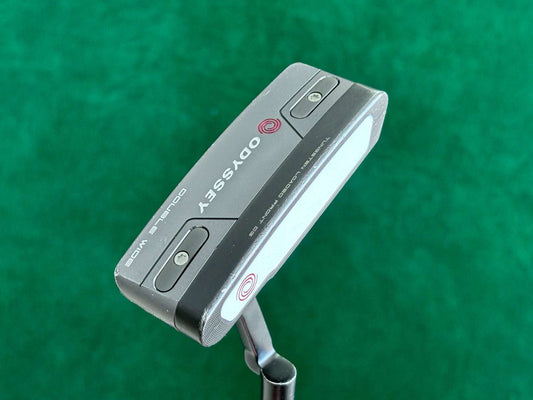The Complete Guide to Buying a Putter
A putter is the most frequently used club in your bag, often accounting for 35–45% of all shots in a round. It’s the club that ultimately finishes every hole, and small improvements with your putter can have a dramatic impact on your score. While many golfers focus heavily on drivers and irons, the biggest and fastest improvement for most players actually comes from choosing a putter that matches their natural setup, posture, stroke path, and visual alignment preference.
At ARC Golf, we work with golfers across a wide range of skill levels, and we consistently see the same pattern: when a putter suits the player, they immediately become more confident standing over the ball and confidence leads to better speed control, more consistent contact, and fewer 3-putts. This guide is designed to help you understand what makes a putter feel “right” and how to choose one that works with your stroke, not against it.
What Is a Putter?
A putter is a club designed specifically for use on the putting green, where precision matters more than distance. Unlike other clubs, which are built to launch the ball through the air, a putter is designed to roll the ball smoothly across the grass.
Key characteristics of a putter:
• Flat or nearly flat clubface (minimal loft, usually 2°–4°)
• Designed for control, not power
• Comes in various head shapes, balance types, and face materials
• Used for short, controlled strokes rather than full swings
The main job of a putter is simple: Help you start the ball on your intended line with the right pace.
The challenge is finding the putter that best matches how you naturally move and aim, which is where the rest of this guide will help.

Why the Right Putter Matters
Putting is a blend of touch, alignment, and repeatable movement. It’s not just about aiming at the target — it’s also about being able to return the putter face to square consistently, without trying to guide or manipulate the stroke.
A well-fitted putter can help you:
• Aim more instinctively at your target line
• Keep your stroke stable and repeatable
• Improve pace control on long and short putts
• Reduce face twisting during the stroke
• Gain confidence when standing over crucial putts
A poor putter fit often shows up as:
• Feeling unsure where the putter is aimed
• Having to “steer” or “force” the stroke
• Struggling to control distance
• Frequent pulls or pushes
If putting feels like a fight, the putter may not be helping you.
The Three Key Elements in Choosing a Putter
When selecting a putter, there are three main design factors that influence how it performs:
Head Shape
Why It Matters: Determines alignment ease and stability
What It Influences: Helps you visually set up square to target
Toe Hang / Balance
Why It Matters: Matches the putter to your stroke type
What It Influences: Controls how the face rotates during the putt
Length
Why It Matters: Affects your setup posture and eye line
What It Influences: Helps produce consistent contact and aim
Understanding these three things will make choosing a putter much easier and more confident.
Putter Head Shapes — Blade vs Mallet
Blade Putters
Blades are traditional, compact putters known for precision and feel. They suit golfers who have a slight arc in their stroke and like to release the putter naturally.
Characteristics:
• Classic, minimalist styling
• Typically more feedback through the hands
• Better for golfers who prefer a traditional look at address
Best For: Players who prioritize touch and feel over maximum forgiveness.
Mallet Putters
Mallet putters have a larger head shape that increases stability and makes alignment easier. They tend to suit straighter putting strokes or golfers who want help stabilizing the face.
Characteristics:
• High MOI (forgiveness)
• Strong alignment guides, visual reference lines
• More stable on mishits
Best For: Players who want forgiveness, alignment help, and consistency.

Stroke Type: Matching Your Putter to Your Movement
Your natural stroke path should guide your putter choice. Many golfers do not know which category they fall into — which is normal. That’s why testing how the face moves naturally is more important than guessing.

Toe Hang vs Face Balanced
This refers to how much the putter wants to rotate during the stroke.
To test: Balance the putter on your finger. If the face points up this is what we call - Face Balanced. If the toe drops this is what we call - Toe Hang.
Face Balanced = Helps keep the face square (good for straight strokes).
Toe Hang = Allows natural rotation (good for arc strokes).
Putter Length & Setup
Putter length directly influences your posture and where your eyes sit relative to the ball.
General guidance:
33"–34" suits most players.
35" is usually for taller golfers or upright setups.
If your eyes sit too far inside the ball it's best to try a shorter length putter. If your eyes sit beyond the ball it's best to try a longer length putter.
A quick fit check: When you stand naturally, your arms should hang relaxed, not reaching or cramped.

Face Feel — Milled vs Insert
Milled Face
Milled putters are carved from a single block of metal, giving them a firmer, more solid feel at impact. They provide excellent feedback, meaning you’ll instantly know whether you struck the ball pure or slightly off-centre. If you like precision, responsiveness, and a more traditional putting sensation, a milled face is a great fit.
Insert Faces
Insert putters use a softer material (often polymer or a multi-layer composite) built into the face to absorb vibration and soften the strike. They’re designed to create a smooth, consistent roll and help off-centre hits feel more forgiving. If you prefer a gentle, quiet contact and consistent speed control, insert faces tend to feel very natural.
Our Range of Golf Putters
-
 SAVE 25%
SAVE 25%Cleveland Frontline CERO - Putter
Regular price $149.00 NZDRegular priceUnit price / per$199.00 NZDSale price $149.00 NZDSale -
Cleveland FRONTLINE ELITE 8.0 34inch - Putter
Regular price $339.00 NZDRegular priceUnit price / per -
Odyssey TRI-HOT 5K DOUBLE WIDE CH 34inch - Putter
Regular price $319.00 NZDRegular priceUnit price / per$349.00 NZDSale price $319.00 NZDSale -
Odyssey TRI-HOT 5K DOUBLE WIDE DB 34inch - Putter
Regular price $399.00 NZDRegular priceUnit price / per
Elevate Your Putts with ARC Golf
We hope this guide has helped you understand the key factors behind finding the right putter for your game.
If you’re ready to explore options, browse our full range of used putters at ARC Golf. All of our putters are quality-checked, performance-tested, and ready to ship anywhere in New Zealand.
At ARC Golf, we make shopping for authentic second-hand golf clubs simple, secure, and affordable. With fast nationwide delivery, verified clubs, and a flexible return policy, you can shop confidently and focus on what really matters, enjoying your next round.







